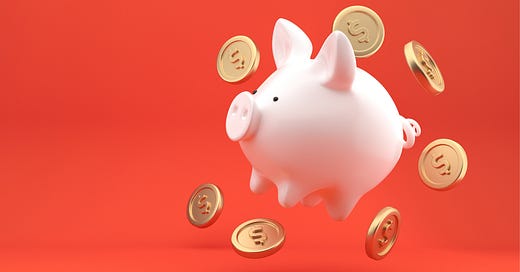
I asked for an allowance when I was a kid, not because I needed one but because I thought it was cool. I thought it was quintessentially American, like a paper route or stick ball. As the son of immigrant parents, I was drawn to Americana and its trappings.
For that same reason I insisted my family have cranberry sauce with our turkey one Thanksgiving. I hated it. I’ll stick with my mom’s empanadas, thank you very much. Similarly, my allowance ended up being better in theory than in practice.
The problem wasn’t with the allowance itself, but with how I related to it. There was no responsibility attached to it and no consequences if I spent it foolishly. I didn’t have to do chores to earn the allowance, and if I ran out of money, I would ask my parents for more. Usually, they obliged, which only undermined the point of the allowance.
I enjoyed it for a few weeks. It was like having kid salary. I only got like 5 or 10 bucks a week, but it was enough to buy some of the things I liked, like Big League Chew or Fleer Ultra basketball cards (pretty sure I still have a Shaq rookie card encased in hard plastic and buried in a cardboard box somewhere in my mom’s garage). I managed my allowance closely for those few weeks, but as soon as I learned there was no risk or reward, I abandoned the idea altogether.
Looking back now, I wonder if an allowance, managed properly, might’ve helped me build some personal finance skills early on. To be fair to my parents, the allowance wasn’t their idea. They weren’t using it as a teaching tool. They were just humoring me.
Are there benefits to an allowance?
The study cited in this article revealed that children with an allowance spend less, which indicates that they are better at managing their money and might suggest they better understand the value of money.
But the professor emeritus of finance and former dean of business at the State University of New York in Buffalo says that’s not always the case. He pointed out that high school students with no allowance performed better on financial literacy tests than those with unconditional allowances.
What about conditional allowances? This article in Psychology Today had the following to say:
The upside of this is that children learn a sense of empowerment—that the amount of money they have in their pockets is up to them and their willingness to work hard. The downside is that if your children may decide they’d rather not do the chores even if it means foregoing their allowance. This is especially true if all of their needs are otherwise taken care of by their parents, and allowance is just the icing on the cake.
In short, there seems to be conflicting evidence and a relative scarcity of research on the subject. So, then, I turn to you, dear readers, for your wisdom.
Did you have an allowance growing up? Do you give your children an allowance? Do you think an allowance is a good teaching tool?
Tell me in the comments!
Visit PabloAndreu.com for more of Pablo’s writing.





The problem with an allowance is that it teaches children the wrong behaviors. I don't reward my children for doing chores. No one pays me for coming dinner or doing the dishes. So what does paying them for doing chores teach them about life?
Instead I reward them for learning something new that they can then teach me, for playing sports, for playing music, for reading a new book.
Good points. Good question. Seems like a generally wise thing to give a kid an allowance. You work hard, you get paid. Then again, as you mentioned: If all their needs are already comfortably met then I’m not sure the lesson fully holds